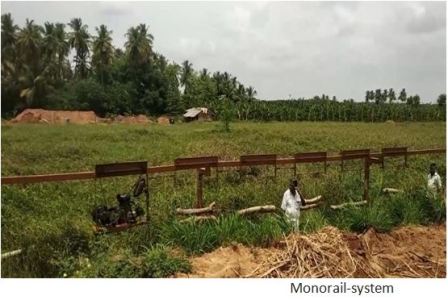IIT-M Researchers Develop Cost-Effective Agri-Produce Transportation System
The lightweight monorail type transportation system can frugally carry agricultural yields from the fields to collection points near the farmland.
Researchers at the Indian Institute of Technology Madras (IIT-M), jointly with a farmers’ NGO, Pothu Vivasayeegal Sangam, have developed a unique, efficient, and cost-effective agricultural transportation system to address the labour shortage, a major issue faced by Indian farmers.
Vivasayeegal Sangam, have developed a unique, efficient, and cost-effective agricultural transportation system to address the labour shortage, a major issue faced by Indian farmers.
The lightweight monorail-type transportation system can frugally carry agricultural yields from the fields to collection points near the farmland. “Steel posts can be erected easily adjacent to the farmland, on which the monorail system would be mounted. On this rail, trolleys for carrying the products are to be fitted, and they can move back and forth. Once the operation is over, it can be dismantled and moved to other farmlands,” said Prof. Shankar Krishnapillai from the Mechanical Engineering Department of the IIT-M.
“The system can be extended by adding lightweight monorail units depending on the distance to be covered. Only two persons are needed to operate the system: one each at the loading and unloading points,” Prof. Krishnapillai explains.
A petrol engine can propel the system. Researchers plan to use solar power in the future to make the system more cost-effective and sustainable. The research team and members of the NGO have successfully tested this prototype monorail-based cableway system at a farm in Nanjai Thottakurichi village of Karur district, Tamil Nadu.
The workforce shortage is one of the major issues plaguing the Indian farming system, especially during the post-harvest period, when significant human resources are required to transport agri-produces, such as sugarcane, banana, or paddy from the field to the nearby collection point. The problem becomes even more acute in wetland farms, as labourers find it difficult to walk across soggy land with heavy headloads.
Shortage of workforce in farming operations will increase in the future for several reasons, including the migration of workers from agricultural regions to nearby cities and towns in search of employment. The Central Institute of Post-Harvest Engineering and Technology (CIPHET), Ludhiana, has estimated the annual value of harvest and post-harvest losses of major agricultural produces at the national level to be of the order of Rs. 92,651 Crore, calculated using production data of 2012-13 at 2014 wholesale prices. For cereals, pulses, oilseeds, fruits, and vegetables, this loss ranges from 4-65% to 15.88%. The newly developed monorail-based system can help bring this down at the harvesting stage.
